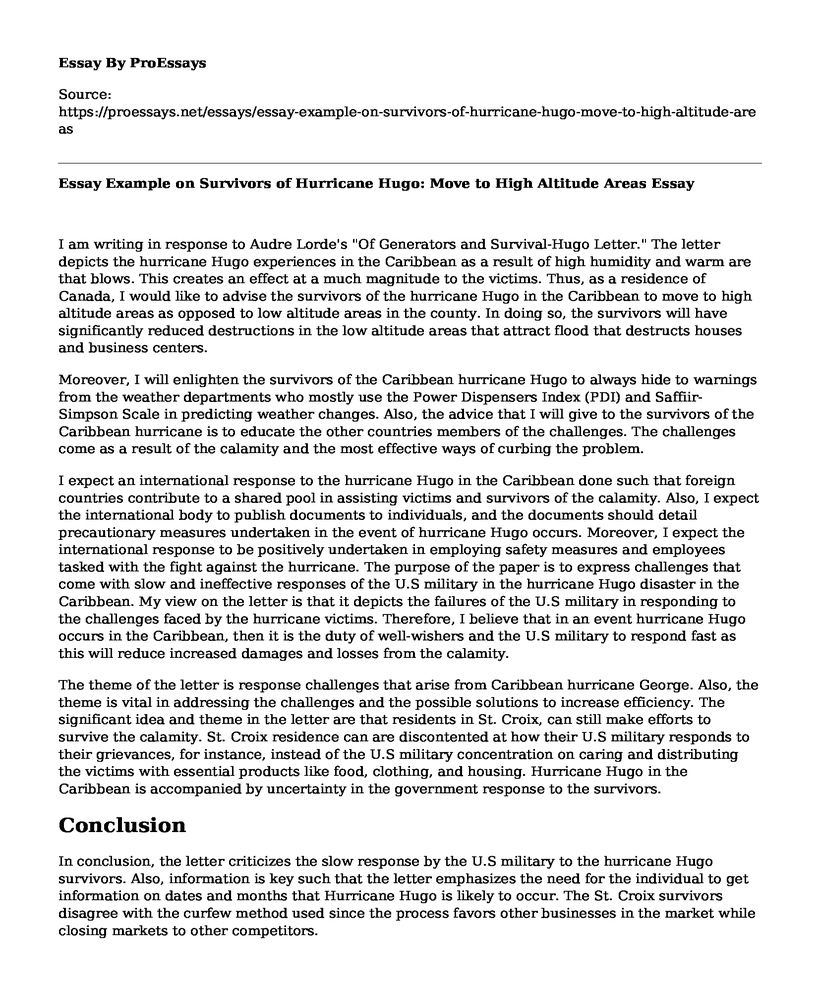I am writing in response to Audre Lorde's "Of Generators and Survival-Hugo Letter." The letter depicts the hurricane Hugo experiences in the Caribbean as a result of high humidity and warm are that blows. This creates an effect at a much magnitude to the victims. Thus, as a residence of Canada, I would like to advise the survivors of the hurricane Hugo in the Caribbean to move to high altitude areas as opposed to low altitude areas in the county. In doing so, the survivors will have significantly reduced destructions in the low altitude areas that attract flood that destructs houses and business centers.
Moreover, I will enlighten the survivors of the Caribbean hurricane Hugo to always hide to warnings from the weather departments who mostly use the Power Dispensers Index (PDI) and Saffiir-Simpson Scale in predicting weather changes. Also, the advice that I will give to the survivors of the Caribbean hurricane is to educate the other countries members of the challenges. The challenges come as a result of the calamity and the most effective ways of curbing the problem.
I expect an international response to the hurricane Hugo in the Caribbean done such that foreign countries contribute to a shared pool in assisting victims and survivors of the calamity. Also, I expect the international body to publish documents to individuals, and the documents should detail precautionary measures undertaken in the event of hurricane Hugo occurs. Moreover, I expect the international response to be positively undertaken in employing safety measures and employees tasked with the fight against the hurricane. The purpose of the paper is to express challenges that come with slow and ineffective responses of the U.S military in the hurricane Hugo disaster in the Caribbean. My view on the letter is that it depicts the failures of the U.S military in responding to the challenges faced by the hurricane victims. Therefore, I believe that in an event hurricane Hugo occurs in the Caribbean, then it is the duty of well-wishers and the U.S military to respond fast as this will reduce increased damages and losses from the calamity.
The theme of the letter is response challenges that arise from Caribbean hurricane George. Also, the theme is vital in addressing the challenges and the possible solutions to increase efficiency. The significant idea and theme in the letter are that residents in St. Croix, can still make efforts to survive the calamity. St. Croix residence can are discontented at how their U.S military responds to their grievances, for instance, instead of the U.S military concentration on caring and distributing the victims with essential products like food, clothing, and housing. Hurricane Hugo in the Caribbean is accompanied by uncertainty in the government response to the survivors.
Conclusion
In conclusion, the letter criticizes the slow response by the U.S military to the hurricane Hugo survivors. Also, information is key such that the letter emphasizes the need for the individual to get information on dates and months that Hurricane Hugo is likely to occur. The St. Croix survivors disagree with the curfew method used since the process favors other businesses in the market while closing markets to other competitors.
Yours Faithfully,
Jim Bob
Cite this page
Essay Example on Survivors of Hurricane Hugo: Move to High Altitude Areas. (2023, Apr 23). Retrieved from https://proessays.net/essays/essay-example-on-survivors-of-hurricane-hugo-move-to-high-altitude-areas
If you are the original author of this essay and no longer wish to have it published on the ProEssays website, please click below to request its removal:
- Future Farmers of America
- Concerns Regarding Physiological Needs of Disasters Victims Essay
- Environmental Issues Essay Example
- Paper Example on Natural Disasters: Challenges in Risk Management Despite Technological Advancement
- Essay on Pollution Threatens Egypt's Water Supply: Challenges & Consequences
- Research Paper on Pollen Analysis: Unveiling Climate Change and Ecological History
- West Virginia Floods 2016 & Hurricane Maria 2017: Disaster Analysis & Mitigation - Essay Sample







